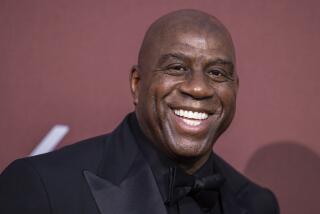Magic Johnson to Rejoin Lakers Despite HIV
- Share via
Earvin (Magic) Johnson, whose retirement from basketball last year stunned the nation, said Tuesday that he will rejoin the Lakers, making him the first player known to be carrying the AIDS virus to play professional sports.
Johnson says he will play 50 to 60 of the 82 regular-season games, passing up games on consecutive nights.
He plans to fly to Honolulu this weekend to get ready for the team’s training camp, which opens Oct. 9.
“God put me here to play basketball and do my thing on the court,” Johnson told a hastily called news conference at the Forum. “That’s where I’m going to do my thing. . . .
“I’m not going to sit here and say you’re not going to run a risk, but life itself is a risk. But to have that fun and be out there, I’ll take it and I know everything is going to be all right. I’m not worried about that. If I was concerned about that, I wouldn’t be up here. I’d be saying I’m staying retired.”
The news conference was in stark contrast to the one held Nov. 7 when Johnson announced that he had tested positive for the human immunodeficiency virus, which causes AIDS. On Tuesday, as on Nov. 7, Johnson was accompanied by his wife, Cookie, and his doctor, Michael Mellman. But this time the room was filled with smiles.
Johnson has been taking AZT and says he has had no ill effects from the medication or any symptoms of the disease.
People who have the AIDS virus usually go two to 15 years before showing symptoms. The average is seven years. Those infected usually die two to three years after the symptoms are detected.
Johnson returned to basketball by stealing the show in February’s National Basketball Assn. All-Star Game. He followed that by being one of the leading players on the U.S. team that won a gold medal at the Barcelona Olympics.
He began considering a full-fledged comeback in January, even calling his agent, Lon Rosen, at one point, telling him to inform the Lakers he was coming back.
Johnson backed off after his physicians, especially AIDS specialist Dr. David Ho of New York, urged caution. However, by March he was thinking about returning for the playoffs until several key players were injured, taking the Lakers out of serious contention.
Johnson said he would use the Olympics as a test. Pleased with his performance, and with an ensuing workout regimen in which he gained 15 pounds in weight training, he decided upon a return.
“The true test for me was playing against the players in practice on the Olympic team and watching as I was getting better and better,” Johnson said. “(I was) playing hard against them every day, going at it like it was a regular game. Also, getting back here and putting on 15 pounds. . . . I’m feeling good and it’s time to get back to what I was doing.”
Johnson’s return carries a degree of risk. “It is a fact he is assuming a risk, the magnitude which we don’t know,” said Mellman, the Lakers’ team physician. “He also assumed a risk in not playing.
“The difference is we’ve had 10 months and he has been monitored on a regular basis. We’ve been able to follow the (case). So we’ve seen trends. And we’ve been able to see how he evolves through that. We fed him all that information back and he has based a decision on that.”
Mellman said he also weighed the stress of playing and going out of a normal routine against Johnson’s strong desire to play basketball. He said he believed that the benefits would outweigh the risks.
Johnson’s announcement came four days after he quit the President’s Commission on AIDS. Johnson, appointed to the commission by President Bush, criticized Bush for what he called a lack of support from the Administration.
But Johnson said he would reconsider his stand and might rejoin the commission if Bill Clinton is elected President.
Johnson’s announcement is expected to help counter some misconceptions about AIDS.
“It will help educate people,” said Nicole Russo, spokeswoman for AIDS Project Los Angeles. “People who can think you can get HIV from someone’s sweat will see you can’t.” She added that a few televised games starring Johnson will convey messages that the AIDS community has been struggling to get across for years.
“In terms of living with HIV, this is a fantastic example that people with HIV can live normal, healthy, active lives,” Russo said. “It will dispel a lot of the fear and discrimination that people with HIV are exposed to.”
When Johnson returns, he will wear his familiar No. 32. The number was retired in an emotional ceremony at halftime of a Feb. 16 game against the Boston Celtics. His return raises the question of what to do with the jersey that hangs on the wall of the Forum with those of Jerry West, Kareem Abdul-Jabbar, Elgin Baylor and Wilt Chamberlain, other players whose numbers have been retired.
Claire Rothman, general manager of the Forum, says she expects the jersey to stay where it is, but added that she is likely to do whatever Johnson prefers.
Times staff writers Elliott Almond and Bettina Boxall contributed to this story.
RELATED STORIES: C1, C4, C5
More to Read
All things Lakers, all the time.
Get all the Lakers news you need in Dan Woike's weekly newsletter.
You may occasionally receive promotional content from the Los Angeles Times.






